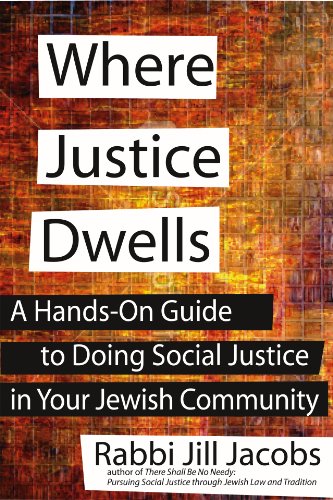Join a community of readers who are committed to Jewish stories
Sign up for JBC’s Nu Reads, a curated selection of Jewish books delivered straight to your door!
Yesterday, Rabbi Jill Jacobs wrote about Sukkot and social justice. Her most recent book, Where Justice Dwells: A Hands-On Guide to Doing Social Justice in Your Jewish Community (Jewish Lights), is now available.
 I started Where Justice Dwells: A Hands-On Guide to Doing Social Justice in Your Jewish Community with a question: Does place matter?
I started Where Justice Dwells: A Hands-On Guide to Doing Social Justice in Your Jewish Community with a question: Does place matter?
In today’s globalized world, it’s easy to say that place doesn’t matter at all. With a few clicks of a mouse, I can skype with friends and relatives all over the world. If I choose tomorrow to move to Fiji, I can do so. If I wanted, I could hire a secretary in India, outsource data entry to Cambodia, and telecommute from a cruise ship on the Atlantic. We no longer live in a world in which we grow up, go to school, work, and die in the same city or even often the same country.
And yet, I had a deep conviction that place does matter. Personally, I have prioritized doing justice work in the place where I live (New York City/the United States) and in Israel, where I have deep roots and much experience. At the same time, I cannot ignore the dire poverty in parts of the world far from where I live, and where I may never visit.
Place plays a fundamental role in Jewish tradition. We tell our people’s story in geographic terms—Abraham left the land of his ancestors and settled in Canaan; Joseph and his brothers went down to Egypt; the Israelite people came out of Egypt, journey through the wilderness, and found their place in the land of Israel. Our history includes sojourns in Europe, North Africa, Asia, and the Arab World. We continue to mourn the destruction of the Temple — once our central place — and the subsequent expulsions from many of the places we have lived. There is even a divine aspect to place — the rabbis call God “HaMakom” — “The Place.”
At the same time, we are a people whose history transcends place. We maintain our traditions even as we move around the world (though these traditions have shifted according to the places where we live). We speak of Am Yisrael—the people of Israel — as a unit not bounded by geography.
So does place matter or not?
I ended up devoting much of the second chapter of the book to a particularly intriguing text that considers how to prioritize our own needs with those of the people of another place. In this text, the people of one town have a well from which they take water to drink, to feed their animals, and to do laundry. People of another town, in which there is no well, stop by to ask for water. The ensuing several centuries of discussion considers which of our own needs take priority, when to share the water, and what responsibility to place on the residents of any individual place to care for their own needs.
The conclusion: Place isn’t everything, but it still matters.
Rabbi Jill Jacobs is the Executive Director of Rabbis for Human Rights-North America and the author of Where Justice Dwells: A Hands-On-Guide for Doing Social Justice in Your Jewish Community (Jewish Lights) and There Shall Be No Needy: Pursuing Social Justice Through Jewish Law and Tradition.